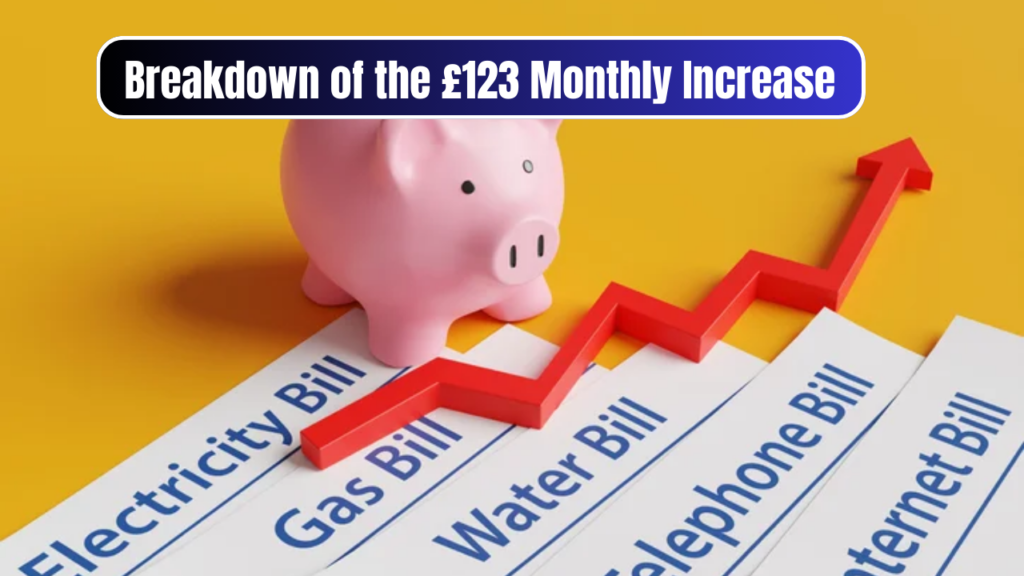Introduction
Households across the UK are bracing for a financial strain as the cost of living is set to rise yet again. Starting in April 2025, the average household is expected to see a £123 increase in monthly expenses due to hikes in energy bills, council tax, water rates, broadband, and insurance premiums. These increases will impact millions, particularly low-income families, retirees, and individuals on fixed incomes.
This article explores:
- Key areas where costs are rising
- Breakdown of the £123 average increase
- Why prices are increasing
- How households can mitigate the impact
- Frequently Asked Questions (FAQs)

Breakdown of the £123 Monthly Increase
The following table provides an estimate of the areas where household expenses are increasing and their projected additional costs:
| Expense Category | Average Increase (£/month) |
|---|---|
| Energy Bills | £50 |
| Council Tax | £18 |
| Water Rates | £12 |
| Broadband & Mobile Bills | £10 |
| Home & Car Insurance | £15 |
| Groceries & Essentials | £18 |
| Total Increase | £123 |
These increases may vary based on location, household size, and provider policies.
Why Are Household Costs Rising?
Several factors are contributing to the price hikes, including:
- Energy Price Cap Adjustments – Ofgem has announced adjustments to the energy price cap, leading to increased gas and electricity costs.
- Council Tax Increases – Many local councils are raising council tax rates to cover growing public service expenses.
- Inflation and Supply Chain Disruptions – Higher food and essential goods prices due to global supply chain issues.
- Water and Utility Price Rises – Water companies are increasing tariffs to fund infrastructure improvements.
- Broadband and Mobile Contract Price Hikes – Telecom providers are raising prices in line with inflation-linked contracts.
- Insurance Premium Increases – Higher costs in car, home, and health insurance due to inflation and claim rates.

How to Mitigate the Impact
Here are some practical tips to help households manage the rising costs:
1. Review and Switch Providers
- Compare energy tariffs using websites like Uswitch or MoneySuperMarket.
- Consider switching to a fixed-rate broadband deal.
2. Apply for Discounts and Support
- Council Tax Reductions: Check if you qualify for discounts based on income, disability, or single occupancy.
- Energy Bill Support: See if you’re eligible for the Warm Home Discount Scheme.
- Water Bill Assistance: Many water companies offer social tariffs for low-income households.
3. Cut Back on Non-Essential Spending
- Reduce subscription services you don’t need.
- Plan weekly grocery shopping to avoid overspending.
- Use cashback apps like TopCashback and Quidco for savings.
4. Improve Energy Efficiency
- Switch to LED bulbs, turn off standby appliances, and install smart meters.
- Apply for government grants for home insulation improvements.
5. Budget and Plan Ahead
- Use budgeting tools like Money Dashboard or YNAB to track expenses.
- Set up direct debits for bills to avoid late fees and penalties.
Conclusion
The upcoming £123 average increase in household expenses will be challenging, but by planning ahead, making informed financial decisions, and seeking available support, households can reduce the financial burden. Keeping up with policy updates, switching to better deals, and making small lifestyle adjustments can help mitigate the impact of these cost hikes.
For further guidance, check resources like Citizens Advice, MoneySavingExpert, and government assistance programs.
FAQs
1. When will these price increases take effect?
Most of the increases will come into effect in April 2025, though some (such as broadband price hikes) may be staggered over the year.
2. Can I challenge my council tax increase?
Yes, you can apply for a council tax reduction if you qualify based on income, disability, or occupancy status. Contact your local council for details.
3. How can I reduce my energy bills?
Switch providers, improve home insulation, and use energy-efficient appliances to cut down on consumption.
4. Will government support be available to help with rising costs?
There are existing schemes like the Warm Home Discount, Council Tax Reductions, and potential additional government interventions.
5. What should I do if I can’t afford the price hikes?
Seek financial advice from Citizens Advice, check for government support programs, and consider reaching out to charities that offer financial aid for essential costs.















